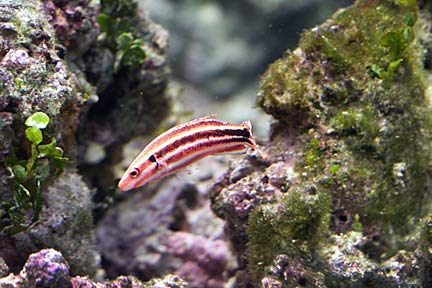
|
Study finds ocean,
land evolution similar
Habitat, not isolation, affect species,
UH and other researchers say
The evolutionary process surprisingly is the same in the ocean as on land: New species arise when populations of animals become isolated, a University of Hawaii researcher and his colleagues have discovered.
"Everybody that works in speciation, almost everybody, thinks that some animals have to be isolated a long time before they turn into a new species," said Brian Bowen, assistant researcher at the Hawaii Institute of Marine Biology on Coconut Island.
Hawaii is a classic picture of the evolutionary theory of new species evolving from isolated populations, he said, noting fruit flies are a primary example with more than 400 species that originated from a single group of colonists.
Scientists had believed for 30 years that that didn't happen in the water, he said.
However, evidence from the new study shows "the rules are the same," Bowen said.
The study was done in the Atlantic Ocean, but the results are the same in the Pacific, he said.
In Hawaii, "we're looking at animals as disparate as opihi and snappers and groupers and a little tiny reef fish, gobies," Bowen said. "What the ecological speciation discovery shows is these animals can radiate into multiple species within the Hawaiian archipelago."
The research was done in the Atlantic because it was a mystery why so many reef fishes are there when there are no barriers and no chance for them to become isolated and develop into separate species, Bowen said.
This was a major obstacle in trying to explain speciation in the sea, Bowen said. "It drove people so far as to say maybe speciation is just fundamentally different in the ocean."
Bowen was at the University of Florida until moving here more than two years ago. He said the research was done in his laboratory there, led by one of his students, Luiz Rocha, now at the Smithsonian Tropical Research Institute based in Panama City.
The group, including scientists at the universities of Hawaii and Florida, the Smithsonian and Harvard University, looked at the genetics of wrasses of the genus Halichoeres, a group of Western Atlantic tropical reef fishes.
In an article in the recent Proceedings of the Royal Society of London, they reported that "genetic evolutionary separations are not between isolated distant locations but between different habitats, in some cases side by side."
Rocha, who will join the Hawaii Institute of Marine Biology as a postdoctoral researcher later this year, said his idea was to test whether wrasses were different genetically north and south of the Amazon barrier.
Genetic differences were more distinct within the two sides of the Amazon barrier than between the two sides, he said. Genetically similar fish were found in ecologically similar habitats, even thousands of miles apart.
Although the speciation process is well accepted for terrestrial and even freshwater animals, Bowen said nobody thought it was possible for marine animals because they have larvae that float around in the ocean for months.
"The assumption was the larvae is like drift bottles, that they go everywhere and there is no chance for speciation in different habitats."
However, researchers in recent years, mostly in Australia, have demonstrated that "larvae are not like drift bottles but are pretty shrewd little guys," Bowen said.
"They can navigate and home in on a reef, so that's the difference that allows ecological speciation," he said.
The selection process is strong enough to produce new species even when there is no isolation, he said.
www.journals.royalsoc.ac.uk/
Hawaii Institute of Marine Biology
www.hawaii.edu/HIMB/
[News] [Business] [Features] [Sports] [Editorial] [Do It Electric!]
[Classified Ads] [Search] [Subscribe] [Info] [Letter to Editor]
[Feedback]
